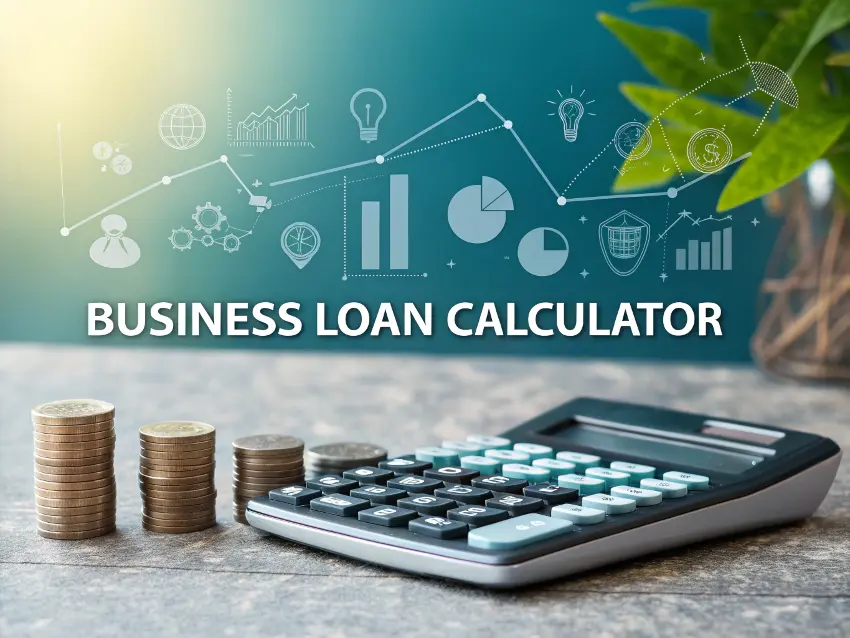Business Loan Calculator
Calculate payment and cost of business financing options

Business Loan Calculator
About Business Loans:
Business loans provide capital for starting, expanding, or maintaining operations. Different loan types serve various business needs, from short-term working capital to long-term investments like commercial property or major equipment.
This calculator helps you estimate payments, total costs, and create an amortization schedule for business financing options.
Types of Business Loans:
Term Loan
Terms: 1-5 yearsRates: 7-30%
SBA Loan
Terms: 5-25 yearsRates: 5-8%
Equipment Financing
Terms: 1-5 yearsRates: 8-30%
Business Line of Credit
Terms: 6 months - 5 yearsRates: 8-24%
Invoice Financing
Terms: 30-90 daysRates: 3-5% + fees
Commercial Mortgage
Terms: 5-25 yearsRates: 4.5-6.5%
Merchant Cash Advance
Terms: 3-18 monthsRates: Factor rates 1.1-1.5
Loan Selection Tips
- Match the loan term to the asset's useful life
- Consider total cost, not just the interest rate
- Check all fees, including origination, closing, and prepayment penalties
- Understand collateral requirements and personal guarantees
- Compare options from multiple lenders before deciding
Term Loan Details
Traditional business loan with fixed or variable interest rate and set term length.
Typical Terms: 1-5 years
Typical Rates: 7-30%
Best For: Equipment purchases, business expansion, working capital
Calculate Business Loan Payments
Loan Details
$
%
Fees & Additional Costs
%
Loan Payment Summary
Monthly Payment:
$0.00
Total Cost:
$0.00
Principal + Interest + Fees
Total Interest:
$0.00
Total Payments:
$0.00
Principal + Interest
Effective Interest Rate (APR):
0.00%
Including fees
Origination Fee:
$0.00
1.5% of loan amount
Loan Cost Breakdown
Payment Allocation
Amortization Schedule
Detailed Amortization Schedule
| Payment # | Date | Payment | Principal | Interest | Remaining Balance |
|---|
About Business Financing
Qualifying for Business Loans
1
Business Credit Scores
Lenders review business credit scores from agencies like Dun & Bradstreet, Experian Business, and Equifax Business. Establish business credit by getting a business credit card, paying suppliers on time, and registering with credit bureaus.
2
Personal Credit Score
For small businesses, lenders often consider the owner's personal credit score. This is especially important for new businesses without an established credit history.
3
Time in Business
Many lenders require businesses to be operational for at least 1-2 years. Newer businesses may need to seek alternative funding sources like SBA loans or online lenders.
4
Annual Revenue
Lenders want to see consistent or growing revenue that demonstrates your ability to repay the loan. Most traditional lenders look for minimum annual revenues of $100,000 or more.
5
Business Plan & Use of Funds
A detailed business plan and clear purpose for the loan demonstrates to lenders that you've thought through how the financing will help grow your business.
Business Loan Terms Explained
Term Length
The period over which you'll repay the loan. Longer terms mean lower monthly payments but higher total interest costs. Match the term to the useful life of what you're financing.
Interest Rates
Can be fixed (staying the same for the entire loan term) or variable (changing with market conditions). Business loans typically have higher rates than consumer loans due to increased risk.
Fees & Charges
Common fees include origination fees (1-5% of loan amount), application fees, closing costs, prepayment penalties, and late payment fees. All these affect the true cost of borrowing.
Collateral Requirements
Secured loans require business or personal assets as collateral, reducing lender risk and potentially lowering interest rates. Unsecured loans don't require specific collateral but generally have higher rates.
Personal Guarantees
Many business loans require a personal guarantee from business owners, making them personally responsible for repayment if the business can't pay. This puts personal assets at risk.
SBA Loans Explained
SBA loans are partially guaranteed by the U.S. Small Business Administration, reducing risk for lenders and making financing more accessible to small businesses.
| SBA Loan Type | Loan Amount | Term Length | Interest Rates | Best For |
|---|---|---|---|---|
| SBA 7(a) | Up to $5 million | 5-25 years | 5-10% | General business purposes, working capital, expansion |
| SBA 504 | Up to $5.5 million | 10-25 years | Fixed rates, typically lower than 7(a) | Major fixed assets like real estate and equipment |
| SBA Microloans | Up to $50,000 | Up to 6 years | 8-13% | Startups, small businesses, underserved markets |
| SBA Express | Up to $500,000 | 5-25 years | Similar to 7(a) | Faster approval for smaller loan amounts |
Common Business Loan FAQs
How long does it take to get a business loan?
Timeframes vary widely depending on the lender and loan type. Online lenders can approve loans in 24-48 hours, while traditional banks may take 2-4 weeks. SBA loans typically take 30-90 days for full approval and funding.
What's the difference between APR and interest rate?
The interest rate is the percentage cost of borrowing the principal amount. APR (Annual Percentage Rate) includes both the interest rate and additional loan costs like origination fees, providing a more comprehensive measure of the loan's total cost.
Can I get a business loan with bad credit?
Yes, but options may be limited and more expensive. Alternative lenders, merchant cash advances, and equipment financing (which uses the equipment as collateral) are more accessible with lower credit scores. Some lenders focus more on business performance than credit scores.
Should I choose a fixed or variable interest rate?
Fixed rates provide payment stability and are better when rates are low or during periods of expected rate increases. Variable rates start lower but fluctuate with market conditions, making them riskier but potentially less expensive if rates remain stable or decrease.